Iran Summons Norway Envoy Over Parliament Speaker’s Remarks
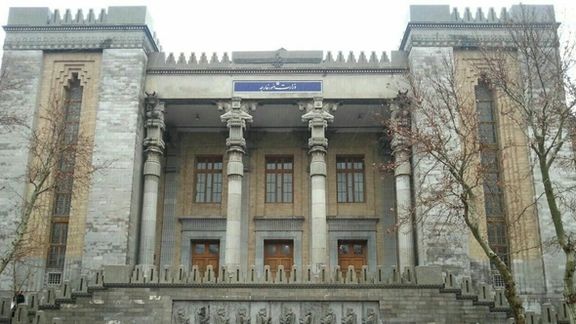
Iran’s Foreign Ministry has summoned the Norwegian ambassador over remarks made by the country’s parliament speaker criticizing the Islamic Republic over ongoing protests.

Iran’s Foreign Ministry has summoned the Norwegian ambassador over remarks made by the country’s parliament speaker criticizing the Islamic Republic over ongoing protests.
The Norwegian envoy to the Islamic Republic, Sigvald Tomin Hauge, was summoned by the ministry in protest to the “unacceptable statements” of the Speaker of the Parliament of this country against Iran.
Masud Gharahkhani, an Iranian-born lawmaker, and president of Norway’s parliament expressed solidarity with anti-government protests in Iran on Friday in an interview with Iran International.
“You’ve been in power for 44 years, enough is enough,” he addressed the Islamic Republic and its Supreme Leader Ali Khamenei in a message during his interview.
Iran called his remarks “interventionist” saying such statements are “unacceptable”.
This is the second time Iran summons Norway’s envoy over Gharahkhani’s remarks since September.
Meanwhile, an Iranian member of the Swedish parliament published a video on his Instagram page asking Iranian leaders Ali Khamenei, President Ebrahim Raisi and the IRGC commander Hossein Salami to pack their luggage and prepare to travel to the International Court of Justice in The Hague to be held accountable for their crimes.
Alireza Akhundi further called on the Iranian army to join the people and support the protesters.
According to the Norway-based Iran Human Rights Organization, at least 304 people have been killed during the recent protests that began across Iran after the killing of 22-year-old Mahsa Amini by police in custody.
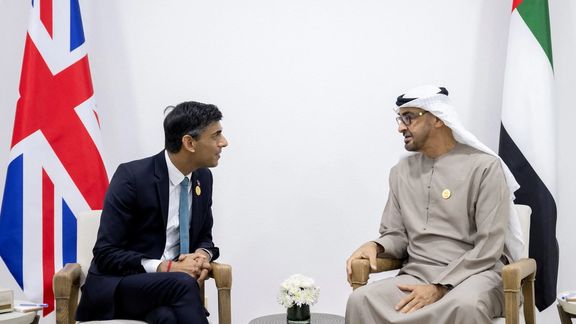
Rishi Sunak, the British prime minister, has pledged to improve relations with Persian Gulf Arab states beyond “defense cooperation” and stressed the threat from Iran.
Sunak met UAE president Mohammed bin Zayed al-Nahyan on the sidelines of the COP27 United Nations climate gathering in Egypt. Beleaguered over bullying allegations against a leading minister back in London, Sunak told Saudi-owned al-Arabiya that the United Kingdom was “lucky in its important and historical relations with the Gulf states.”
Britain has been a major regional arms supplier, with around 60 percent of its annual £110-billion ($126 billion) weapons exports going to the Persian Gulf, with Saudi Arabia, easily the region’s highest defense spender, taking the lion’s share. But a small amount has been going to the UAE, with only £887 million ($1.17 billion) to the UAE in the decade up to 2017, and France in December 2021 securing an €21-billion sale ($21 billion) to the UAE of advanced Rafale jets.
While the UAE and Iran have restored diplomatic relations since President Ebrahim Raisi took office in August 2020, Tehran-Riyadh talks in Baghdad have not yet led to the return of ambassadors. The Wall Street Journal recently reported Saudi warnings to the US of an imminent Iranian attack, although skeptics have noted this came just after Riyadh’s relations with President Joe Biden were strained by Saudi coordination with Russia over oil production cuts in the run-up to November 8 US Congressional elections.
‘Look who’s here! NASMAMs’
After months of lobbying in Washington, Ukraine said Monday it had received the first delivery of surface-to-air missiles that President Volodymyr Zelenskyy has claimed can combat drones supplied to Russia by Iran.
Defense Minister Oleksiy Reznikov said the NASAMS air defense systems would “significantly strengthen” its armed forces. “Look who’s here! NASAMS and Aspide air defense systems arrived in Ukraine!,” Reznikov tweeted. The Aspide is an Italian-made missile with a 40-km range.
A spokesman for the Germany government said Monday it was up to Kyiv to decide whether to open peace talks with Russia. Aside from €2-billion military aid to Ukraine, the German government has allocated $200 billion to cushion domestic and business consumers against energy price rises.
Iran acknowledged Saturday that it supplied drones to Russia, claiming this was before the current phase of the conflict began in February, but Kyiv has made great play of the supply in its lobbying efforts and recently named Iranian airlines it said had delivered drones. The US, France, Germany, and the United Kingdom have argued that Iran sending drones to Russia contravenes United Nations Security Council Resolution 2231, which endorsed the 2015 Iran nuclear deal, the JCPOA (Joint Comprehensive Plan of Action).
‘Not evolving in right direction’
Efforts to restore the JCPOA, which the US left in 2018 imposing ‘maximum pressure’ sanctions on Iran, have paused since the summer. Josep Borrell, foreign policy chief of the European Union, which has chaired JCPOA talks, said Monday that “positions between the parties” were “not converging yet,” meaning “things are not evolving in the right direction.”
Bilateral meetings between Iran and the US in the summer, chaired by the EU, and subsequent exchanges of messages, failed to resolve differences. Iran has sought ‘guarantees’ that it would be cushioned economically against the US again leaving the agreement. The atmosphere has also soured with the US and European states imposing additional sanctions on Iran, including against its ‘morality police’ over the death of a 22-year-old woman.
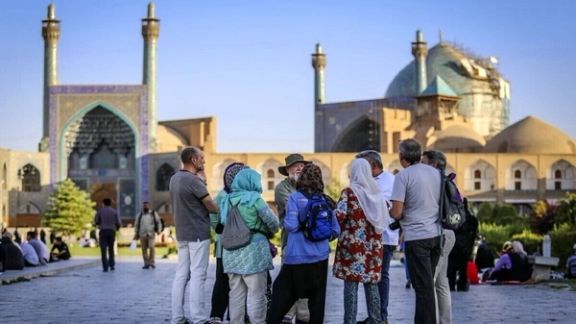
The Islamic Republic has arrested many foreign tourists who took photographs from the ongoing protests in Iran.
The chairman of the board of Iran's Tourist Guide Association said on Monday that the detainees have been taking photos “out of curiosity.”
Mohsen Haji Saeed expressed regret over this approach by the Islamic Republic, saying “all the tourists, who are seen in the wrong places, are not necessarily spies.”
He made the comments in a meeting of several lawmakers with tourism activists on Sunday in Tehran.
“Those who are responsible to provide security in the country should be told that the security of tourists and its international repercussions are important,” added Haji Saeed, highlighting that this issue has become a vital demand for tourism and lawmakers should help change “the wave that has been generated against Iran” in other countries in recent months.
These statements were made as the government has not published any information about tourists being arrested in recent protests.
Iran’s Intelligence Ministry announced the detention of nine non-Iranian citizens from Germany, Poland, Italy, France, the Netherlands and Sweden on September 30. Then the ministry called the antigovernment protests in Iran "riots" alleging the arrested were "on the stage or behind the scenes" of the recent protests.
According to ISNA News Agency, the impact of the protests on the tourism industry in Iran was one of the topics raised in this meeting.
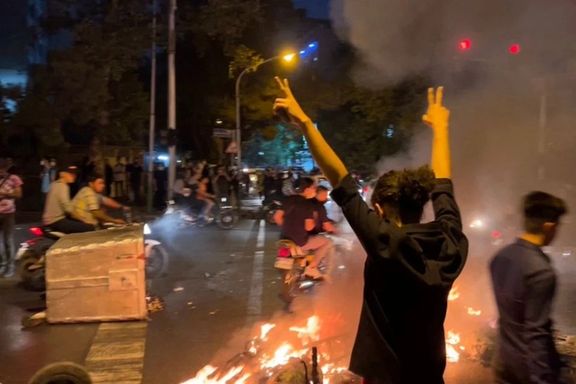
As antigovernment protests continue in Iran, the government will face a multitude of additional economic problems and energy crisis in the coming months.
The most urgent problem is a fast-falling national currency that began to nosedive in early November, dropping to historic lows almost on daily basis. The US dollar has risen from 295,000 rials to 365,000 in two months. But that is just an early signal of what is to come.
The retail sector is having its own multiple problems. First, during protests people are buying less, as recently the garment industry complained of very low sales to consumers who are in no mood to go shopping.
Second, a draconian denial of access to the Internet by the government, to contain the protests, has badly hurt hundreds of thousands of small businesses dependent on sales through social media.
Third, Iranian consumers have begun boycotting large retailers and businesses believed to be controlled by the Revolutionary Guard and other regime entities, as another tool in their civil disobedience movement.
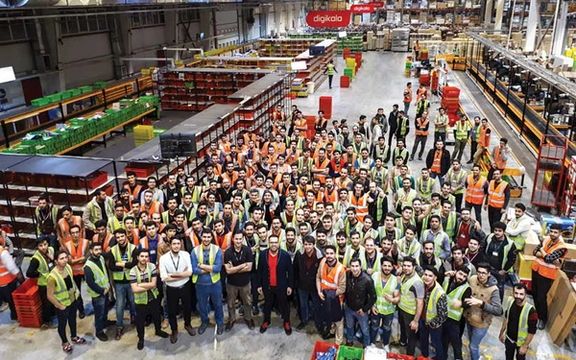
Digikala, Iran’s Amazon, and Mihan dairy and food company have been targeted by activists on social media, who tell the people not to enrich the government’s suppression machine. In a matter of days, there are signs of lower sales by both companies, which sponsored appeals from their workers who asked the public not to harm their livelihoods.
Fourth, and the perhaps the most predictable is a looming shortage of natural gas in the winter, as pressure in Iran’s South Pars maritime fields in the Persian Gulf are gradually falling. The country has failed to secure capital and western technology to improve drilling and pumping system to boost production.
Iran has the world’s second largest natural gas reserves after Russia with almost 30 trillion cubic meters of potential supply, but it needs to invest $50 billion and use special technology only a few western firms can provide to keep its level of daily production at around 700 million cubic meters.
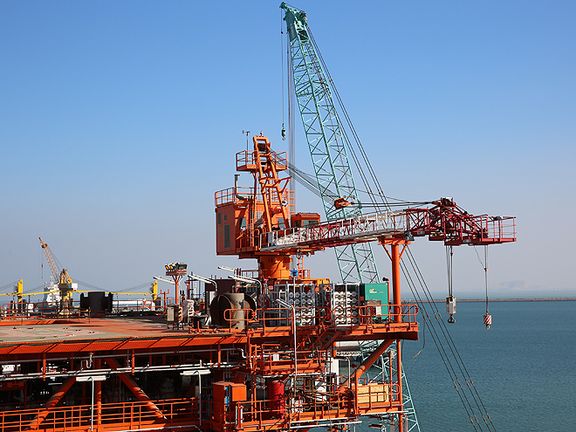
The former head of the national gas company, Hamidreza Eraghi told ILNA news website in Tehran on November 7, that this winter the country might be forced to buy gas from Turkmenistan to be able to supply electricity and keep industries in business. Already, in the past few years as consumption has risen, there have been both shortages of electricity and gas. The government sells energy at ridiculously cheap rates and consumers have no incentive to save, with usage fast increasing each year.
There are also ongoing strikes in the oil and gas sectors in solidarity with nationwide protests, which will further hurt production.
What Iran needs most is imported technology for horizontal drilling for gas, Eraghi said, and this winter imports should increase to prevent an industrial shutdown.
The government has periodically highlighted the need to boost prices to lower consumption, but that would anger a public that has become impoverished in the past four years after the United States imposed sanctions on Iran’s oil exports. Already, with nationwide antigovernment protests raging, the government has no way to increase energy prices.
Ordinary Iranians have fallen victim to high inflation rate for years. No one knows exactly what the current annual inflation rate is, but if one would believe the government, it is at least 40 percent, with food prices having risen by 100 percent in the past 12 months. The falling national currency will accelerate inflation as Iran imports a significant part of its food and raw materials.
With a convergence of so many negative economic developments there is very little the regime can do to stop the protesters, who openly say they want to get rid of the Islamic Republic, not only for its economic mismanagement but also for its draconian denial of social freedoms.
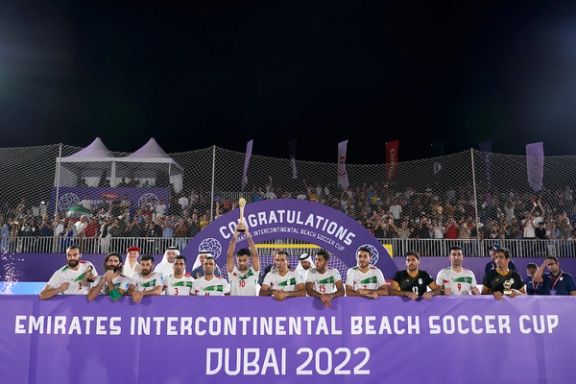
Islamic Republic officials have issued threatening messages to members of its beach football team as well as the United Arab Emirates that recently hosted the Beach Soccer Intercontinental Cup.
In a short article published Monday by Iran Daily, the official mouthpiece of the government, the Islamic Republic threatened the UAE of consequences over its lack of action to stop spectators who chanted slogans against the Islamic Republic after a match between the Iranian and Emirati national teams in Dubai on Saturday.
Criticizing the UAE police for a lack of confrontation with the people, the paper said that the UAE government’s attitude is “not compatible with good neighborliness.”
It added that “if the country does not react appropriately [against spectators], it must accept the consequences of this anti-Iranian action,” threatening that UAE will soon see “the consequences of this hostile action.”
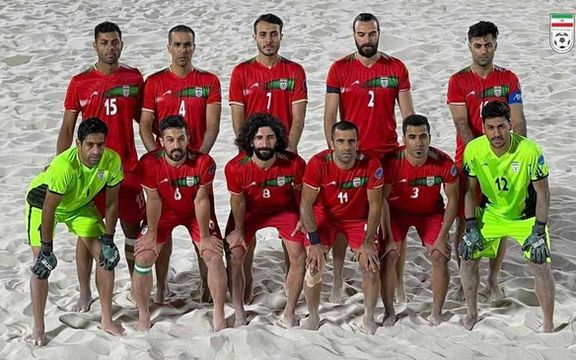
The Iranian beach football federation also issued a statement to downplay the protest by Iranian spectators, describing them as “unwise and opportunistic.”
The federation also threatened the players of the national squad for their acts of solidarity with the current wave of antigovernment protests, ignited by the death of 22-year-old Mahsa Amini in the hands of the hijab – or ‘morality’ -- police.
The national team players did not cheer or celebrate after winning the cup following their final victory against Brazil and also refused to sing the national anthem of the Islamic Republic at the beginning of their semifinal match against the UAE.
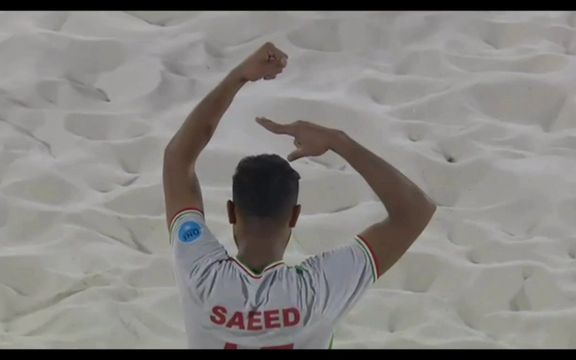
During the final, Iranian striker Saeed Piramoun expressed his solidarity with Iranian protesters by miming the hair cutting gesture after scoring a goal, a move that has drawn enormous appreciation by Iranian social media users and renowned footballers alike. His move has also inspired several graffiti and digital art pieces.
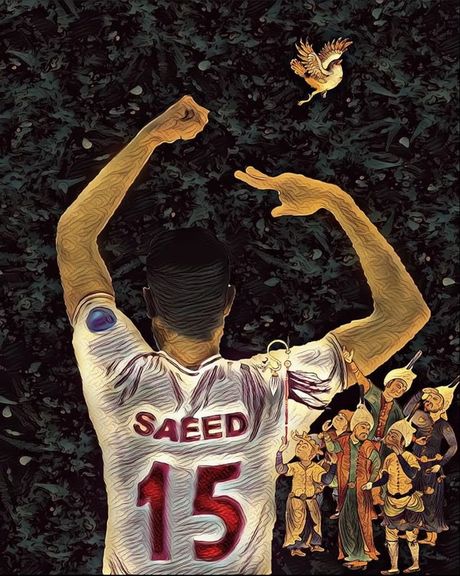
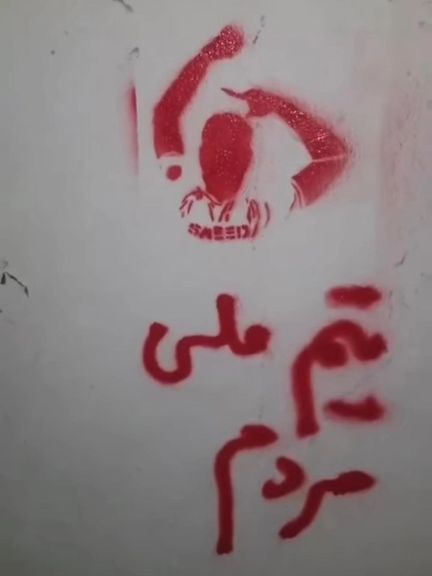
While the national anthem was being played before the match started, Iranian players seemed to have been forced to sing along this time, but the Iranians present at the stadium kept booing until it ended.
Vowing to punish the players, the Islamic Republic’s federation said according to regulations by world football governing body FIFA, players should avoid "any political act." It said some of the players did not observe "professional ethics."
Mentioning FIFA’s regulations is unexpected from the Islamic Republic’s authorities who have been ignoring such rules when it comes to allowing women into stadiums or female referees to officiate matches in men’s leagues.
Iranian President Ebrahim Raisi has expressed concern over possible problems that may happen during the FIFA World Cup scheduled to open later in the month. Earlier in November, he tasked the Foreign Ministry to contact Qatari officials regarding the issue to find ways “to predict and prevent possible problems."
Earlier in the month, FIFA President Gianni Infantino wrote to the World Cup teams asking them to concentrate on soccer in Qatar and not let ideological “battles” be dragged into football fields. “We know football does not live in a vacuum and we are equally aware that there are many challenges and difficulties of a political nature all around the world… [but] at FIFA, we try to respect all opinions and beliefs, without handing out moral lessons to the rest of the world,” Infantino said in his letter.
He wrote the letter in reaction to calls by a group of Iranian sports personalities and lawyers who have requested FIFA to eliminate Islamic Republic’s team from the World Cup.
Sosha Makani, the ex-goalkeeper of Iran’s national team told Iranians in a video on his Instagram late in October that it is wrong to go to Qatar to watch football matches because the Iranian regime will exploit their presence in stadiums to tell the world they support the Islamic Republic.
Since March, many Iranians have been urging FIFA to ban Team Melli from the World Cup for forcibly barring women from entering stadiums to watch matches. Under FIFA pressure, Iranian authorities started to let in a cherrypicked group of women so they would not face bans and penalties. However, since the start of the current uprising and a lackluster support from the national squad, the calls on FIFA to ban Iran have become stronger.
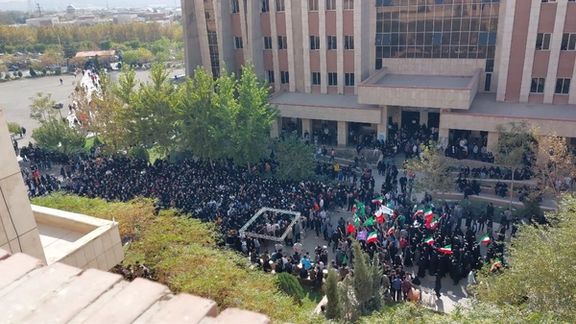
Nearly 600 university professors and researchers in Iran have called for the unconditional release of students arrested during current antigovernment protests.
In a statement on Monday, the academics demanded the cancellation of “all anti-civil right decrees against students.”
They described the most important duty of the government as providing “psychological, educational and professional security” for students, which, according to the signatories, has been neglected for a long time “deliberately or due to the incompetence of officials.”
Protests and sit-ins continue at various universities in the second month of the uprising against the Islamic Republic, despite violent repression against students.
“Unfortunately, a significant number of students in educational centers are facing punishments like arrests, academic suspension, ban on entering universities and dormitories, etc., and they and their families have been subjected to physical and mental threats and harassment in an organized and targeted manner,” reads the statement.
These professors also warned that if their demands are not met, they will use all the civil and protest channels to achieve their rights along with their students.
Meanwhile, the Coordination Council of Trade Unions of Iranian Cultural Organizations demanded the unconditional release of Iranian dissident rapper Toomaj Salehi who was arrested on October 30 after publishing songs to support the popular protests.